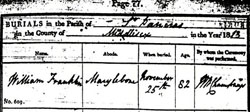Death Of Benjamin Franklin
|
| updated |
Copy Link Code
|
 When did Benjamin Franklin die? On April 17th, 1790, at the relatively staggering age of 84, Benjamin Franklin died surrounded by family at his home in Philadelphia. How did Benjamin Franklin die? It was not the quickest or most comfortable death. After hours of difficult breathing, an abscess in his lung burst and further complicated respiration; at about eleven o'clock at night, Franklin slipped into a peaceful, lethargic state and was soon dead. Franklin was buried alongside his common law wife, Deborah Read Franklin, who had passed away sixteen years before. Nearly 20,000 people attended his funeral in Philadelphia and mourning was felt around the world. Franklin was well respected in France, Britain and much of Europe and in the nascent United States of America he was revered as a national hero. In the latter years of his life, Franklin had served as President of Pennsylvania (modern day Governor) for three terms upon his return to Philadelphia from diplomatic duty in Franc. He had also emerged as a leading abolitionist and egalitarian, releasing his own two slaves and proposing means of educating freed African Americans for the purpose of joining society.
When did Benjamin Franklin die? On April 17th, 1790, at the relatively staggering age of 84, Benjamin Franklin died surrounded by family at his home in Philadelphia. How did Benjamin Franklin die? It was not the quickest or most comfortable death. After hours of difficult breathing, an abscess in his lung burst and further complicated respiration; at about eleven o'clock at night, Franklin slipped into a peaceful, lethargic state and was soon dead. Franklin was buried alongside his common law wife, Deborah Read Franklin, who had passed away sixteen years before. Nearly 20,000 people attended his funeral in Philadelphia and mourning was felt around the world. Franklin was well respected in France, Britain and much of Europe and in the nascent United States of America he was revered as a national hero. In the latter years of his life, Franklin had served as President of Pennsylvania (modern day Governor) for three terms upon his return to Philadelphia from diplomatic duty in Franc. He had also emerged as a leading abolitionist and egalitarian, releasing his own two slaves and proposing means of educating freed African Americans for the purpose of joining society.
The death of Benjamin Franklin could not have been much of a surprise at his extended age. The life expectancy of contemporary America was somewhere in the 40's and medicinal methods were still rather primitive. Franklin, an innovative and pragmatic man, had established his own habits of maintaining health that were relatively revolutionary including a preference for open windows to stale air and moderation over gluttony. Although he could certainly afford to relax in his later years, Franklin maintained an active mind and body through study and movement. His wit was just as powerful at age 90 as it was at 29; letters from his last decade demonstrate the humor he retained throughout his life of writing. It was in the last year of his life, in November 1789, that the famous Benjamin Franklin death and taxes quote emerged. In a letter to his friend Jean-Baptiste Leroy, Franklin wrote, "Our new Constitution is now established, and has an appearance that promises permanency; but in this world nothing can be said to be certain, except death and taxes." This cynical humor was on par with all of the dark humor found in his publications such as "Poor Richard's Almanack".
When Ben Franklin died, he would not know how long the United States might survive. With a Constitution only ratified in the year before his death and a military power yet to grow in any comparison to European rivals, things must have been very uncertain. But aspects of the legacy that Franklin left behind assured that this nation would not only survive, but truly thrive. His ingenuity, industriousness and pragmatic sensibility would inspire many future American leaders in every generation since. The sayings he left behind, from his autobiography and periodicals, have survived in the modern American lexicon for their wit and hard truth. Besides his long list of inventions, Franklin left a record of voluntarism that is still at the core of American virtue.
